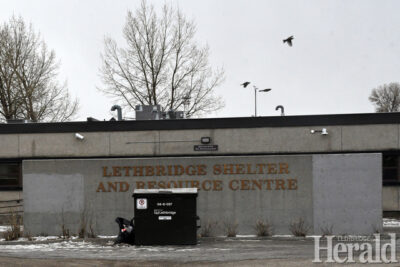City releases lease details for Blood Tribe shelter takeover
By Lethbridge Herald on January 24, 2023.
 Herald photo by Ry Clarke
The Lethbridge Shelter and Resource Centre had its terms of leasing agreement up for discussion during Tuesday’s City Council meeting.
Herald photo by Ry Clarke
The Lethbridge Shelter and Resource Centre had its terms of leasing agreement up for discussion during Tuesday’s City Council meeting.Al Beeber – LETHBRIDGE HERALD – abeeber@lethbridgeherald.com
The City of Lethbridge and Blood Tribe Department of Health have agreed upon a lease agreement for a shelter operating at the location of the former Lethbridge Shelter and Stabilization Centre on 2 Ave. N.
Details of the agreement were provided to city council on Tuesday in the consent agenda in one of several reports from administration.
The lease agreement information was contained in a report by City Manager Lloyd Brierley. The lease agreement was made on Jan. 1.
A resolution was made at a special council meeting on Dec. 23 to keep the lease information confidential until Tuesday under Freedom of Information and Protection of Privacy Act Sections 16, 21, 23, 24 and 29.
Section 16 refers to Harmful to Business Interests of a Third Party, 21 is Harmful to Intergovernmental Relations, 23 refers to Local Public Body Confidences, 24 is Advice from Officials and 29 is information that is or will be available to the public.
Under the agreement the new tenant will pay annual rent of $99,975 for each year of the term and any renewal terms to be paid in two instalments. The first instalment will be $24,993.75 payable at the same time as the term rent of $25 which will be paid on or before the commencement date of the shelter’s operation.
The second instalment of $74,981.25 will be due on or before June 30 of the term and any renewal terms.
The agreement states that any additional rent will be held in reserve by the City and will be used for mutually agreed upon maintenance and replacement projects in relation to what are called in the agreement “demised premises.”
The agreement further states that by Feb. 28 of each year the parties will endeavour to agree on maintenance and replacement projects that the additional rent will be used for that year with all projects to be completed by Oct. 31 unless otherwise mutually agreed upon.
The parties may agree mutually to renew the agreement for as many as four one-year terms. Both parties can terminate the lease without cause upon 30 days notice. Furthermore, the tenant will “peaceably surrender and give up to the City vacant possession of the demised premises in substantially the same condition and state of repair as at the commencement date” if upon expiration or early termination of the lease.
The City can immediately terminate the agreement if the tenant is no longer operating the shelter or is no longer receiving provincial funds for its operation.
Terms of the agreement call for the building to be operated “as a homeless shelter, wellness/recovery centre and…stabilization centre.” Only uses permitted in the agreement will be allowed at the facility. Prior written consent has to be obtained if the tenant wants to modify, change or alter permitted uses, says the agreement.
The agreement also states the tenant mustn’t do or permit to have done anything at the premises which will result in the creation of a nuisance. Sub-leasing of any part of the facility is not allowed.
The tenant is also required to pay the costs of required security measures and must provide to the City a copy of a fire safety plan, security management plan and first responder access plan as well as updated copies of those plans if and when they are amended.
The new tenant is responsible for paying all utility costs and for furnishings and equipment to be used as well as their repair, replacement or upgrades.
The new tenant is responsible to ensure financial controls are in place relating to operation of the shelter.
The shelter operator must also comply with all good neighbour agreements entered into by it and provide the City with copies of any executed agreements. A breach by the tenant of any terms in good neighbour agreements will be considered to be a breach of the lease and development permit 02-1104 issued by the City for the use of the building as a homeless shelter.
Failure to comply with those two matters will be considered a breach of the lease and the City may exercise any remedies available in the event of default by the tenant.
20-19




